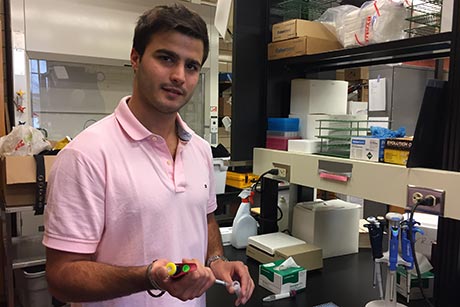Pre-vet students can study abroad in Argentina
By Krishna Ramanujan

Cornell juniors and seniors can get a taste of veterinary school while working on their Spanish through a new study abroad program in Argentina, administered by the College of Agriculture and Life Sciences (CALS) Exchange Office.
The program’s first cohort of Cornell students, Zachia Gray ’16 and Jonathan Gorman ’16, began their semester abroad in January at the Facultad de Ciencias Agrarias y Veterinarias at Universidad Nacional Del Litoral in the town of Esperanza, with eight weeks of intensive Spanish before they started 16 weeks of veterinary coursework in March. This is Cornell’s first pre-veterinary exchange program.
At the same time, the program has welcomed its first Argentinian student, MatíasCravero, who is studying animal science in CALS this semester in Ithaca, as part of a reciprocal agreement with the Argentinian university.
“We wanted to give students firsthand exposure to what it’s like to be in veterinary school,” said Christine Potter, a coordinator with the CALS International Exchange Program and Partnerships.
The exchange was the brainchild of Julio Giordano, assistant professor of animal science, who hails from Balnearia, a rural agricultural town in the Province of Cordoba 430 miles northwest of Buenos Aires. Potter helped bring the program to fruition by visiting the Argentinian university and working out logistics.
In order to qualify, Cornell students must have a 3.0 grade point average or higher, be a junior or senior, and have at least two semesters of college Spanish. At the university, courses are taught in Spanish, as part of a five-year combined undergraduate and veterinary degree.
“The [Cornell] students have daily interactions with veterinary students,” and they can observe clinical care and surgeries at the Universidad Nacional’s small and large animal hospitals, Potter said.
Gorman is keeping a blog where he describes his classes in bird production, aquaculture, and public health and zoonosis. He also describes his accommodations, food – he’s a vegan – and language, among other things.
Cravero, the son of a dairy farmer, is learning about different aspects of dairy farm management and implementing on-farm technologies here at Cornell. While working in Giordano’s lab, Cravero also had an opportunity to learn about dairy cattle physiology and management research, and he has travelled to many local progressive dairy farms.
“Here I can see a lot of novel management strategies and new technologies,” Cravero said. “In the future, I am sure that many of these technologies will arrive in Argentina, and I can help both my family operation and future clients because I will be familiar with their benefits and on-farm implementation,” he said.
Organizers hope the program can soon accommodate five or six students travelling to Argentina every year, Potter said.
Media Contact
Get Cornell news delivered right to your inbox.
Subscribe